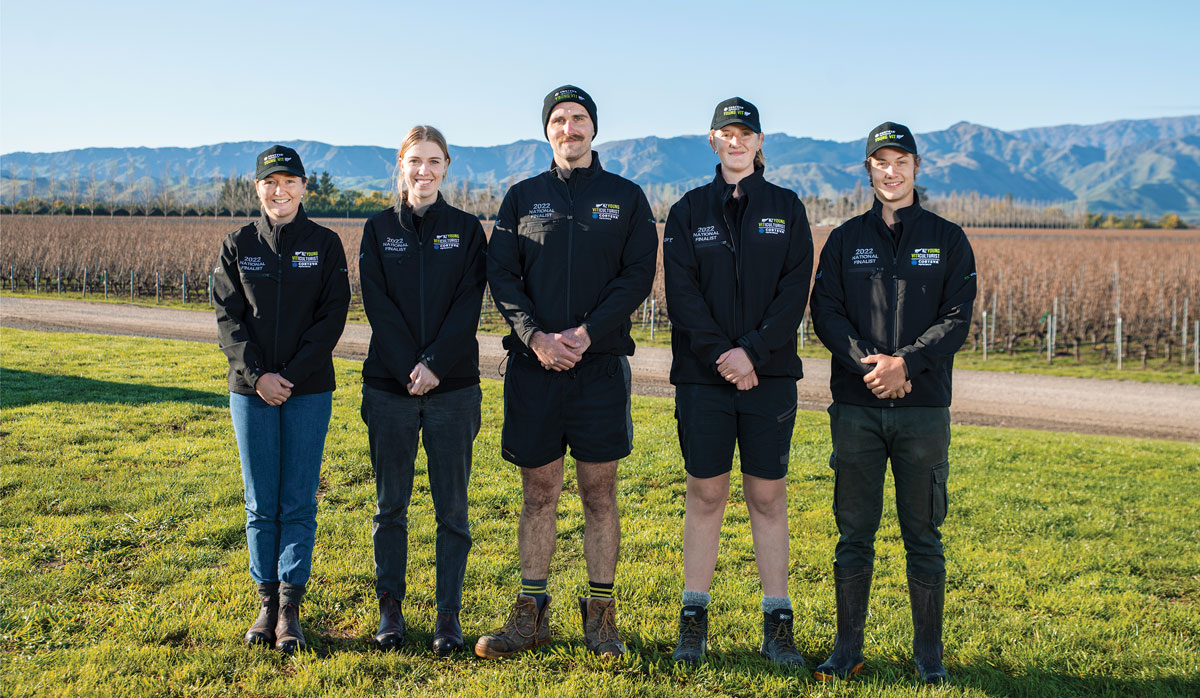Growing Legacy
Thirty-six years after Dave and Chris Macdonald followed a vineyard dream to Marlborough, and 28 years after they named a wine label for their children Blair and Deni, the family is devoted to Bladen, says Deni Hopkins
Suburban Auckland might not seem the logical start line for a stellar career in grape growing.
But the 2022 Corteva Young Viticulturist of the Year believes his urban upbringing gives him a fresh perspective on the science and art of his trade. “I am probably from one of the least traditional backgrounds,” says Tahryn Mason, a vineyard supervisor at Villa Maria’s Seaspray Cluster in the Awatere Valley. “I don’t have any preconceived ideas of what it should be.”
Tahryn was studying history and philosophy at Auckland University in 2016 when he got his first holiday job running nets over a Villa Maria vineyard, which led to casual work in the vines. “Somewhere along the line it just sort of clicked that sitting in a room at uni wasn’t where I wanted to be,” says Tahryn. He hadn’t been attracted to sciences at school, but the work got him thinking about building that knowledge, and he began taking courses through the Primary ITO, eventually climbing to his Level 4 certificate while on the job. “All the knowledge I have built is self-taught, under my own steam,” he says.
He also grew and tested that knowledge through the Young Vit competitions, starting with the Auckland/Northern regional event in 2019. “I have treated it as a real learning opportunity every single year,” he says after four regional competitions and two tilts at the national title. “Trying to learn from my mistakes and plug the gaps in my knowledge has really driven me to work hard to become better year-in-year, year-out."
The more he learns, the more committed he is to viticulture, which he describes as “an interesting take” on farming. “You are trying to grow a really premium product and it’s a fine balance between art and science.” Research is key to decision making, alongside management plans, wine styles and the block itself, he says. “It can be quite subjective. In the same company two different winemakers might want to do two different things.” And he loves that the work he does in the field – whether that’s through inputs or the absence of inputs – can achieve all of that. “That’s the fascinating bit for me.”
When he won the Marlborough regional finals in July, not long before his 30th birthday, Tahryn knew the final at Indevin’s Bankhouse Estate in Marlborough on August 30 would be his last opportunity to compete, before aging out of the competition. But he’s got no intention of slowing his drive to learn and push boundaries, and remains keen to explore a better way of growing.
 |
|---|
|
Tahryn Mason named Young Viticulturist of the Year. |
The more he considers farming, the more convinced Tahryn is that things are backwards. “We should focus a lot more energy and attention into growing the soil and building resilience in the soil first, and building that through long term to the grapes.” The Seaspray Cluster is comprised of two conventional and two organic vineyards, but for Tahryn the answer is not one or the other. He abhors herbicide strips and vineyards mowed to a “bowling green” aesthetic, and admits he is guilty of “being lulled into an organic versus conventional dynamic”. But he’s now keen to explore a more nuanced “toolkit” for vineyards that will make them more resilient, reducing the need for reactive measures. “In the future a mixed model between the two will revolutionise the industry,” he says
Ditching the “bowling green clean” is key to that model, he adds. “We could eliminate a lot of extra work for ourselves by working in with nature and letting things grow naturally.” Cover crops and swards provide “living root systems” more aligned with the natural environment vines evolved within, says Tahryn, who dreams of one day driving around Marlborough and finding undervine plantings in every vineyard.
Consumer pressure and government regulations regarding herbicide will drive a change of practice for those not already doing it, says Tahryn. “If we are not looking at alternatives, and at the forefront of research in those areas, we will very quickly be left behind.” Building resilience is about knowing what the alternatives are, he adds. “Because not everything works for everybody.” That’s particularly true of cover cropping, with an array of site specific impacts, including on the performance of wines. He notes the need for trials to see whether the effect is as expected, and to highlight any other positive or negative consequences.
A few years ago Tahryn thought his viticulture ambitions would be satisfied by having a few hundred hectares of grapes under his control, “but the more I advance the more I think I have something to offer the industry as a whole,” he says, noting a growing passion for nutrition and soil health. “If in 10 years I was specialising in that field and how that relates to what we want to do, I think I’d be pretty happy.”
 |
|---|
|
The national finalists at Bankhouse |
Tahryn is enjoying a short lull in his studies, with his next competition – New Zealand Horticulturist of the Year – not until 2023. Given the whirlwind of harvest, the birth of his son, the regional competition and then the nationals, he is looking forward to making up for some lost family time.
The industry faces challenging times, “but I am still quite hopeful for the future”, Tahryn says, noting that some see him as an idealist. “There are waves to crest on the horizon yet, and the worst may be yet to come. So building resilience and being adaptive now will be make or break for this industry I think.”

The end of the year is fast approaching, so here are some thoughts on a few of the significant developments…

OPINION: When I moved to Marlborough two decades ago, I found countless lines of tidy vines, neatly mowed and carefully…
The large 2025 harvest will exacerbate the wine industry's "lingering" supply from recent vintages, New Zealand Winegrowers Chief Executive Philip…
If you find a new consumer in a developed wine market, you are taking them from someone else, says Blank…
From removing stink bug taint from one wine to balancing excessive bitterness in another, a New Zealand-grown technology is helping…